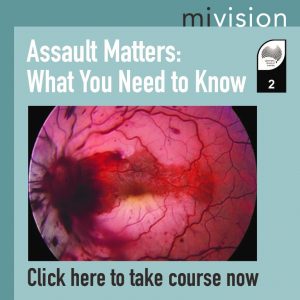Assault Matters: What You Need to Know
Available from: 1/05/2019
Where to publish: mivision publication and www.mieducation.com
Provider: Mivision
Contact: Nikki Byrne, [E] nikki@mivision.com.au, [P] 02 8336 8616
Learning Objectives
- 1.Understand assault presentations from a legal perspective and recognise “suspected” assaults. Patients may present with an anxiety overlay which necessitates a tailored examination strategy to facilitate an urgent or semi-urgent referral. Recognize urgent referrals and provide suitable communication to nearest eye hospital.
- 2. Have a management plan which involves photography to support any legal claim by the victim. Understand roles / relationship of others attending the consultation. Understand victim’s rights and the choice to use an interpreter.
- 3.Recognize level of attention to detail required for record keeping depending on the presentation. History needs to be quotations from patient. A clear recording manner for symptoms and signs needs to be followed. Your presence or your record may be subpoenaed to court. Choices in patient care need to be clearly understood.
Max points awarded: 2.00
Session Information
| Name |
|---|
| Assault Matters: What You Need to Know |
| Activity Type |
| Independent Learning with Assessment |
| Therapeutic? |
| No |
| Manufacturer/Supplier? |
| No |
| Points for attending & Passing Assessment |
| 2.00 |
| Name | Activity Type | Therapeutic? | Manufacturer/ Supplier? | Points for attending & Passing Assessment |
|---|---|---|---|---|
| Assault Matters: What You Need to Know | Independent Learning with Assessment | No | No | 2.00 |
This article describes the cases of two patients who presented to a Sydney practice. It outlines issues that are relevant to optometry, identifying aspects of the victim’s presentation and behaviour that may arise within case management.
LEARNING OBJECTIVES
When consulting victims and suspected victims of physical assault:
- Understand there are varied presentations of assault,
- Recognise a victim’s rights,
- Know your duty of care,
- Realise the importance of empathy, and accurate, detailed record keeping,
- Have a plan in place to manage their care, and
- Recognise the need, and know the most effective way, to urgently refer on to the nearest eye hospital.
